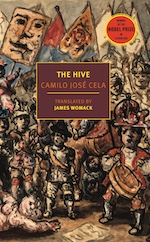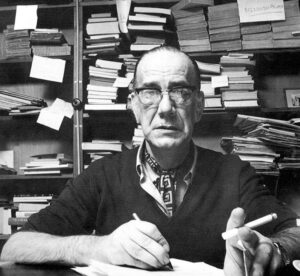 The reading group selection for November is The Hive by Nobel laureate Camilo José Cela. Our discussion is postponed and will be held Wednesday, December 6, at 7:00 PM online via Zoom. The Zoom link will be sent the afternoon of the meeting to anyone interested in attending. Email bookbeatorders@gmail.com to sign up. Books are in stock now and discounted 15%. Please call (248) 968-1190 for more information.
The reading group selection for November is The Hive by Nobel laureate Camilo José Cela. Our discussion is postponed and will be held Wednesday, December 6, at 7:00 PM online via Zoom. The Zoom link will be sent the afternoon of the meeting to anyone interested in attending. Email bookbeatorders@gmail.com to sign up. Books are in stock now and discounted 15%. Please call (248) 968-1190 for more information.
Following Cela’s first novel The Family of Pascual Duarte (La Familia de Pascual Duarte), The Hive (La colmena) was initially published in 1951 by the Argentinian publisher Emecé Editores. Like his first novel, The Hive was denied publication in his native Spain due to censorship, and remained unpublished there until 1966. This new edition from New York Review of Books is the first English edition that is complete and uncensored.
The Hive is a fragmentary novel, a collection of vignettes that concern the lives of some 300 characters over the course of a few days. Taking place in 1940’s Madrid, on the heels of the Spanish Civil War and in the shadow of WWII, Cela’s stories are filled with concerns of classicism, the universal and existential condition of human suffering, the poverty and hunger of his characters and their society, scenarios often disturbing and profane. As Adrian Nathan West writes in The New York Times, “The Hive remains an inevitable monument in Spanish literature, an updated ‘Disasters of War’ whose vignettes revolve around the endurance of the Spanish character through the ravages of poverty and despotism.”
“Three hundred characters in 260 pages. How do you possibly keep track of so many names, so much intrigue?….But the blurring of identity is in line with Cela’s reduction of human beings to a few basic needs….In this limbo between realism and absurdism the characters struggle for survival….It was more or less inevitable that such a negative vision of life in Madrid would be banned under Franco’s dictatorship.” —Tim Parks, London Review of Books
“There is a secret slot for Cela at his best, as one of the great prose stylists, plural, of Spain — a man dangerously like us.” —Roberto Bolaño
“Cela is the Goya of Franco’s Spain.” —Paul West
“It is not to be wondered that the French censorship disapproves of Cela’s novels . . . his literary affiliations are of the most radical; they are with Camus and Sartre, with Moravia, with Zola and French naturalism.” —Saul Bellow
“His best work . . . a carnivalesque reconstruction of the Spanish tradition, a nightmarish, surrealistic depiction of human endeavor.” —Julio Ortega
 Camilo José Cela (1916-2002) won the Nobel Prize in Literature in 1989. Though he wrote prolifically and audaciously in a number of different genres, he is best known for his novel The Hive, which was published in Argentina in 1951 after being banned in Franco’s Spain. In addition to his writing, he produced drawings and paintings and also appeared in several films.
Camilo José Cela (1916-2002) won the Nobel Prize in Literature in 1989. Though he wrote prolifically and audaciously in a number of different genres, he is best known for his novel The Hive, which was published in Argentina in 1951 after being banned in Franco’s Spain. In addition to his writing, he produced drawings and paintings and also appeared in several films.
